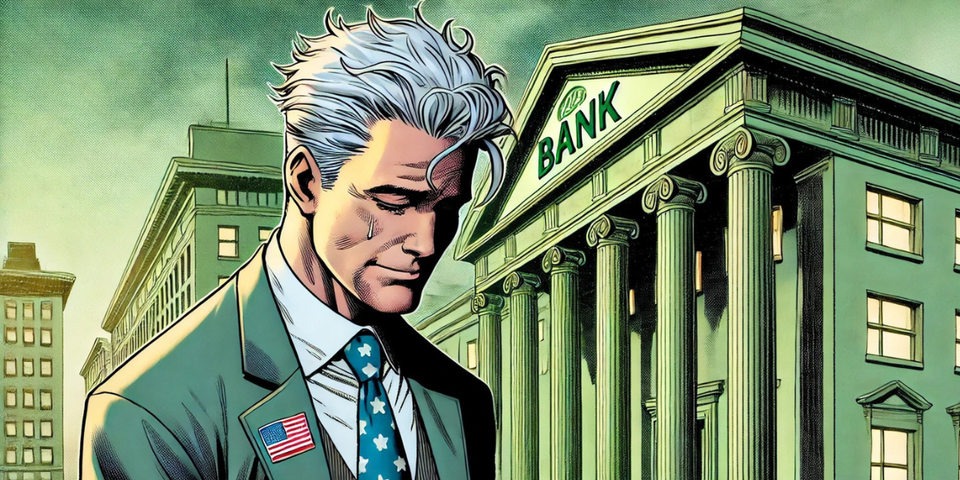Fed up and done

“So long, and thanks for all the climate-adjusted credit risk parameters.”
The Federal Reserve appears to be breaking up with climate risk. Last month, it formally withdrew from the Network for Greening the Financial System (NGFS), the club of climate-focused central banks and supervisors. Then this week, Bloomberg published – and then retracted – an article suggesting the Fed’s “climate program” had ended.
I don’t know the circumstances around this snafu, but I doubt the journalist strayed too far from the truth of what’s going on in the Eccles building. I wouldn’t be surprised if aspects of the Fed’s climate work – like climate scenario analysis and participation in multinational working groups on climate-related financial risk – are in the process of being wound down. Some rump data gathering and supervisory engagement may persist, sure, but I wouldn’t put money on the Fed announcing anything new with “climate” or “environmental” in its title this decade.
Of course, the Trump administration and its anti-climate, anti-science, anti-regulatory political climate likely had a role to play here. The New York Times reports that in the wake of Trump’s executive orders rescinding Biden-era initiatives on climate change – including one on climate-related financial risk – the New York Fed pulled out of co-sponsoring an event covering climate-related topics, and the San Francisco Fed halted a regular seminar on climate economics.
Although the Fed is famously stuffy about its independence, it has form when it comes to swaying with the political winds. Indeed, the Fed first joined the NGFS only after Biden became president-elect in late 2020, even though the club had existed since December 2017.
As important as politics, though, are personnel. No matter the policy preferences of the man in the White House, they are unlikely to make much headway at the Fed if it isn’t staffed by folks who share them – passionately. Indeed, I’d argue that a dearth of climate hawks at the central bank has as much, if not more, to do with the Fed’s rapid retreat from climate risk-related efforts than any ramblings out of the Oval Office. Moreover, it explains why the Fed didn’t get much done on the climate front these past four years.
It didn’t have to be this way. Under Trump 1.0, the chief climate champion at the Fed was Lael Brainard, an Obama-era nominee to the Board of Governors who stood out as a lone voice for taking climate-related financial risks seriously among her peers.
After Biden took the reins, she became Vice Chair in 2022. That same year, the Fed announced its pilot climate scenario analysis and first proposed climate-related risk management principles for large banks. I don’t doubt Brainard’s presence was important in pushing these initiatives forward.
Then, in early 2023, Biden poached her from the Fed to serve as Director of the National Economic Council. I can’t say for sure, but I reckon her departure had a lot to do with the then much slower pace of climate action from the Fed. The finalized principles on climate-related risk management weren’t completed until September 2023 – nearly a year on from their proposal – and the climate scenario analysis results didn’t see the light of day until May 2024, almost two years after they were announced.
Brainard’s exit may not have mattered so much to the climate risk cause had Biden’s top choice for the Fed’s Vice Chair of Supervision (one of the Board’s most powerful and important roles) been approved by the Senate. Sarah Bloom Raskin was the hawkiest of climate hawks, and would have undoubtedly done much to advance the Fed’s climate work had Republicans – and then-Democrat Joe Manchin – not distorted her statements and made her out to be some wild-eyed ideologue. Sadly, it was not to be. She withdrew her nomination once it became clear she would not be confirmed.
So for nearly half of Biden’s term, the Fed lacked a high-profile climate champion. Yes, the NY Fed had, and still has, Kevin Stiroh, but his rank and influence is not the same as that of a Fed Board member. Without strong leadership, it’s no surprise that the Fed’s climate work petered out, culminating in the embarrassingly lackluster climate scenario analysis findings, which Tony dissected masterfully at the time.
This is all a roundabout way of saying that I don’t think the end of the Fed’s brief dalliance with climate-related risk and the NGFS is much of a loss. It was never much of an ally even when it was “in the tent”, anyway. Remember in early 2024 when it blocked the Basel Committee’s push to mandate climate risk disclosures and transition plans? Or what about Chair Powell’s repeated exhortations that the Fed has “narrow” responsibilities regarding climate-related financial risk?
Of course, this makes its withdrawal from international climate efforts all the more performative, transparently done to please a mercurial president and a band of zealots hellbent on policing the free associations made by public institutions, private businesses, and nonprofits alike. Sure, perhaps the Fed’s climate work was little more than symbolic. But symbols still matter.
Hence why I’m in full agreement with Madison Condon, an associate professor at Boston University, whose Bluesky post skewers the Fed’s NGFS withdrawal better than I ever could:

Rolls off the tongue, doesn’t it?
Like this article? Show your support by buying us a coffee👇
Member discussion